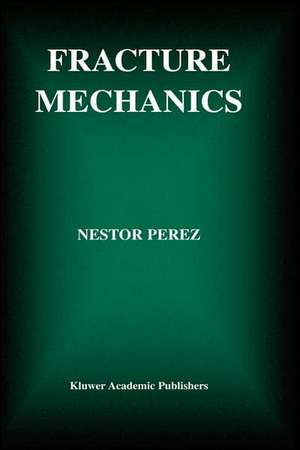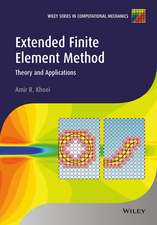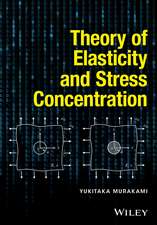Fracture Mechanics
Autor Nestor Perezen Limba Engleză Hardback – 30 apr 2004
This book differs from others in that the subject matter is organized around the modeling and predicating approaches that are used to explain the detrimental effects of crack growth events. Thus, this book will take a more practical approach and make it especially useful as a basic reference for professional engineers.
| Toate formatele și edițiile | Preț | Express |
|---|---|---|
| Paperback (1) | 712.45 lei 6-8 săpt. | |
| Springer International Publishing – 9 iun 2018 | 712.45 lei 6-8 săpt. | |
| Hardback (2) | 635.59 lei 38-44 zile | |
| Springer Us – 30 apr 2004 | 635.59 lei 38-44 zile | |
| Springer International Publishing – 19 aug 2016 | 846.07 lei 6-8 săpt. |
Preț: 635.59 lei
Preț vechi: 836.30 lei
-24% Nou
Puncte Express: 953
Preț estimativ în valută:
121.64€ • 126.66$ • 102.80£
121.64€ • 126.66$ • 102.80£
Carte tipărită la comandă
Livrare economică 06-12 martie
Preluare comenzi: 021 569.72.76
Specificații
ISBN-13: 9781402077456
ISBN-10: 1402077459
Pagini: 308
Ilustrații: 1
Dimensiuni: 156 x 234 x 22 mm
Greutate: 0.63 kg
Ediția:2004
Editura: Springer Us
Colecția Springer
Locul publicării:Boston, MA, United States
ISBN-10: 1402077459
Pagini: 308
Ilustrații: 1
Dimensiuni: 156 x 234 x 22 mm
Greutate: 0.63 kg
Ediția:2004
Editura: Springer Us
Colecția Springer
Locul publicării:Boston, MA, United States
Public țintă
ResearchDescriere
Fracture Mechanics is a graduate level text/professional reference that describes the analytical methods used to derive stress and strain functions related to fracture mechanics. The focus of the book will be on modeling and problem solving as tools to be used in interpreting the meaning of a mathematical solution for a particular engineering problem or situation. Once this is accomplished, the reader should be able to think mathematically, foresee metallurgically the significance of microstructural parameters on properties, analyze the mechanical behavior of materials, and recognize realistically how dangerous a crack is in a stressed structure, which may fail catastrophically.
This book differs from others in that the subject matter is organized around the modeling and predicating approaches that are used to explain the detrimental effects of crack growth events. Thus, this book will take a more practical approach and make it especially useful as a basic reference for professional engineers.
This book differs from others in that the subject matter is organized around the modeling and predicating approaches that are used to explain the detrimental effects of crack growth events. Thus, this book will take a more practical approach and make it especially useful as a basic reference for professional engineers.
Cuprins
Foreword. Preface. 1. Theory of Elasticity. 2. Introduction to Fracture Mechanics. 3. Linear Elastic Fracture Mechanics. 4. Elastic Field Equations. 5. Crack Tip Plasticity. 6. The Energy Principle. 7. Plastic Fracture Mechanics. 8. Mixed-Mode Fracture Mechanics. 9. Fatigue Crack Growth. 10. Fracture Toughness Correlations. Appendix A: Metric Conversions. Index.
Notă biografică
Dr. Nestor Perez is a Professor of Mechanical Engineering at the University of Puerto Rico. His academic interests include Metallurgy & Materials Engineering, Fracture Mechanics, Corrosion, and Thermodynamics.
Textul de pe ultima copertă
The second edition of this textbook includes a refined presentation of concepts in each chapter, additional examples; new problems and sections, such as conformal mapping and mechanical behavior of wood; while retaining all the features of the original book. The material included in this book is based upon the development of analytical and numerical procedures pertinent to particular fields of linear elastic fracture mechanics (LEFM) and plastic fracture mechanics (PFM), including mixed-mode-loading interaction. The mathematical approach undertaken herein is coupled with a brief review of several fracture theories available in cited references, along with many color images and figures. Dynamic fracture mechanics is included through the field of fatigue and Charpy impact testing.
- Explains computational and engineering approaches for solving crack-related problems using straightforward mathematics that facilitate comprehension of the physical meaning of crackgrowth processes;
- Expands computational understanding with theoretical concepts and detailed treatments of formula derivation;
- Presents analytical methods for deriving stress and strain functions related to fracture mechanics;
- Reinforces concepts and modeling techniques with example problems that support comprehension and application of a particular theory.
Caracteristici
Explains computational and engineering approaches for solving crack-related problems using straightforward mathematics that facilitate comprehension of the physical meaning of crack growth processes; Expands computational understanding with theoretical concepts and detailed treatments of formula derivation; Presents analytical methods for deriving stress and strain functions related to fracture mechanics; Reinforces concepts and modeling techniques with example problems that support comprehension and application of a particular theory. Includes supplementary material: sn.pub/extras






